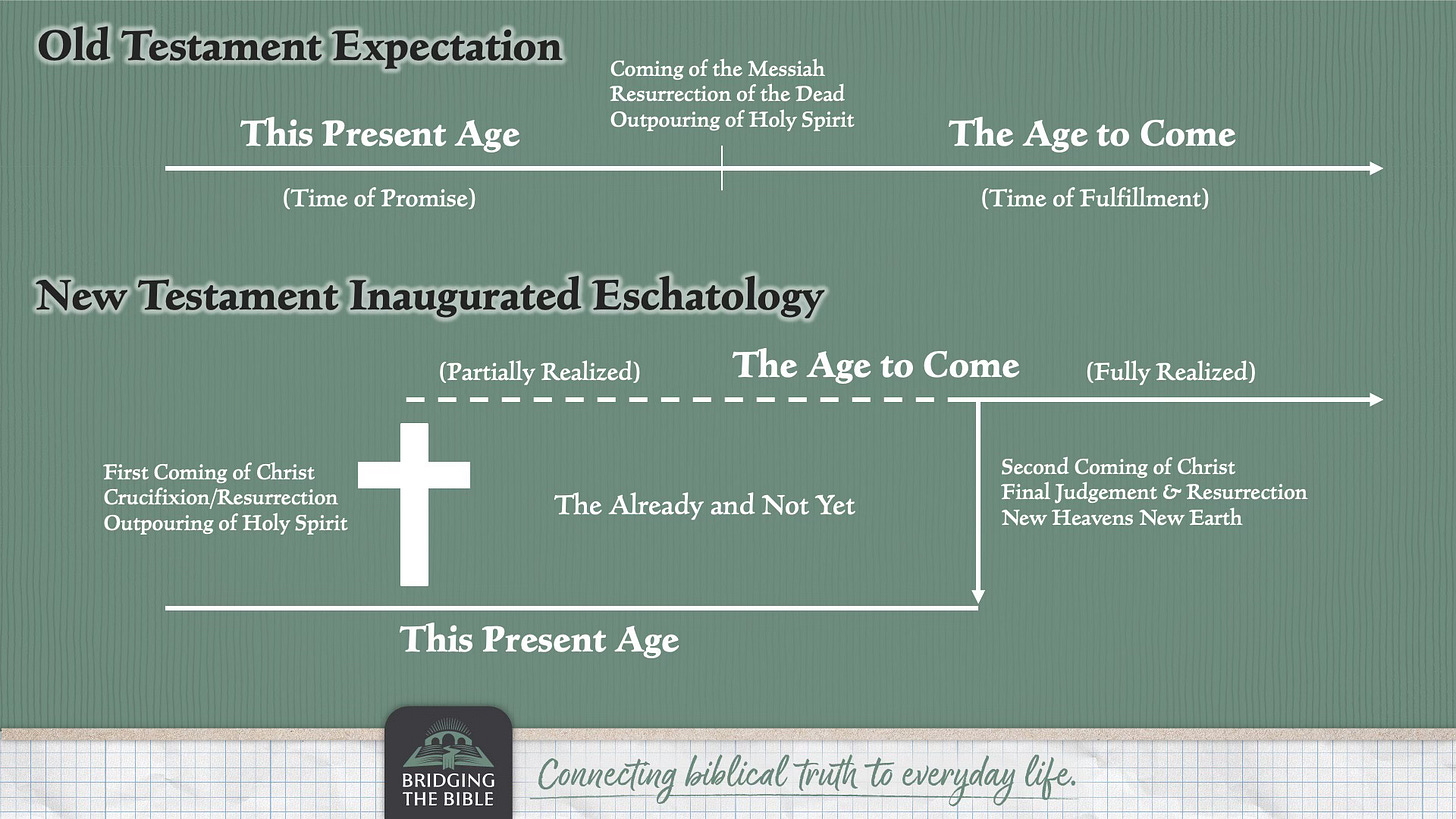The Good News is Already and Not Yet
Grounded in the Gospel part five. Applying the Already-Not-Yet Lens to the Kingdom of God and to our Salvation.
Framing How We Think About the Gospel
You might be like me. When I think about what the Gospel is, I have the tendency to initially think of the Good News about Jesus in the ways I have discussed so far in this series. I think about a message—a message that has the power to save because it reveals the Savior. I think about how this Good News contains the truth of who Jesus is, what He accomplished, our need for Him because of our sin, and how we can have a restored relationship with God by grace through trusting Jesus by faith. I think of how the Gospel is intended by God—through His grace and love—to transform a Jesus-hating rebellious orphan into a Jesus-loving child of God. I also think about how the Gospel is by grace not works, which means we go to Jesus to “get cleaned up” rather than impossibly trying to clean ourselves up first. If these amazing Gospel-101 truths were games of 2D checkers, then the indispensable framework known as the already-not-yet is 3D chess. So, let’s play some chess.
Our first move is to bring time into the equation. The Gospel is the Good News about what God has done through Christ to save us. God did something (past tense). But the Gospel also includes Good News about what God will do in the future. God is not done. God already provided a way of salvation through the sending of His Son Jesus who was crucified and resurrected for us, but God’s grand scheme of salvation is not yet complete until after Christ comes back again. We will better understand this already-not-yet tension by looking at two things: 1) the kingdom of God, and 2) our salvation. Let’s look first at the kingdom of God—at how it is already, how it is not yet, and how it’s both already and not yet at the same time. Then we will apply that same three-fold lens to our salvation.
God’s Kingdom is Already
The kingdom of God is already here because that’s what Jesus said. When Jesus started His ministry, He went about saying, “…the kingdom of God is at hand; repent and believe in the gospel,” (Mark 1:14-15, see also Matthew 4:17). The Bible says that Jesus—in addition to teaching people and healing them—proclaimed “the Good News of the kingdom” (Matt.4:23, 9:35, Luke 8:1). When Jesus performed miracles like casting out demons, He told people it was proof “the kingdom of God has come upon you,” (Mathew 12:28, Luke 11:20). The kingdom of God had arrived on Earth, because the King had arrived! This long-awaited King and His kingdom were promised by God in the Old Testament (2Samuel 7:16,28, Isaiah 9:6-7, Daniel 4:3). Jesus demonstrated and taught the ways of the kingdom, but then He did what He came to Earth to do: die on a tree in our place, conquer sin and death by being raised from the dead, and ascend to the right hand of the Father—the place of total authority and exaltation. Jesus has been reigning from that throne in heaven ever since.
Is there a reign of Christ present on this Earth right now? Yes. One major way the inbreaking of His rule is seen or experienced is via His Body, the Church, through the actions and empowerments of the Holy Spirit. That is why scriptures like Romans 14:17 make sense: “For the kingdom of God is not a matter of eating and drinking but of righteousness and peace and joy in the Holy Spirit.” Seeing the reign of God via the church does not mean the church and the kingdom of God are the same thing. The kingdom of God creates the church, and the church is an instrument of the kingdom. The Church is the people of the kingdom. We are, as George Eldon Ladd put it, “the people of God’s rule who enter it, live under it, and are governed by it.”[1]
This “already” of the kingdom is often referred to by theologians and some pastors as “inaugurated eschatology.” The end has been inaugurated by God. We are in the last days now (1Peter 1:20, 1John 2:18, 1Corinthians 11). Ever since the incarnation, crucifixion, resurrection, and ascension of Jesus—and the pouring out of the Holy Spirit at Pentecost—the kingdom of God has been at hand.
God’s Kingdom is Not Yet
But the kingdom of God on Earth is not yet in its fullness. The second coming of Christ has not occurred yet. Jesus is in heaven right now. The kingdom of Heaven has come to Earth, but not fully yet. A number of years ago, I studied every use of the word “kingdom” in the gospels. I was pleasantly surprised at how many uses of it referred to the future coming of the God’s kingdom once Christ returns to judge the living and the dead (Matthew 16:28, 26:29, Mark 9:1, 14:25, Luke 9:27, 13:28-29, 17:20, 19:11, 21:31, 22:16-18,30). The not-yet of the kingdom is the kingdom we will inherit after final judgment (1Corinthians 15:50). To inherit something in the future means we do not have it yet, though it is promised to us.
In the age to come, the “kingdom of the world” will “become the kingdom of our Lord and of His Christ, and He shall reign forever and ever,” (Revelation 11:15). In other words, this present evil age will end because the reign of God on Earth will be fully completed. The kingdom that is already on Earth right now is not yet complete because Jesus is still in heaven, but when He returns again, He will make His kingdom on Earth perfect/complete. God’s enemies (sin, disease, satan, demons, deception, death etc.) will be defeated once and for all and what remains will be a new Earth with an unhindered reign of God.
God’s Kingdom is Already and Not Yet
So, we find ourselves in the middle of a tension. We live in a time where God’s kingdom is already, while simultaneously being not yet. The future kingdom has broken into this present evil age, but that kingdom is not here in its fullness. The age to come is partially realized now but not fully realized. We are in a unique time of the overlapping of the ages (shown in the diagram below). God’s kingdom has been inaugurated, but it’s been inaugurated in the midst of the current age.
This present evil age (Galatians 1:4) is evil because a) it’s corrupted by sin and b) there’s still is a kingdom of darkness spearheaded by the prince of this world, the devil, (John 12:31) who wars against God and God’s people (1Peter 5:8). Because we are in the already-not-yet of the kingdom, the devil still tries to hinder people from hearing the Gospel and tries to blind people from seeing the light of the Gospel (2Corinthians 4:4, Luke 8:12). Though, the devil wars from a losing position as an already-defeated enemy who knows he’s going down in the end. The devil is on a sinking ship, and he is trying to bring down as many people with him as he can. Jesus did defeat the devil and the power of sin and death at Calvary, yet those enemies have yet to be annihilated because Jesus’ second coming has not happened yet.
In the meantime, we believers are citizens of Heaven, ambassadors of God’s kingdom, who have access to the authority and power of Jesus through the Holy Spirit. We participate in extending the reign of God over the darkness by spreading the light of Christ, preaching the Good News to all the ends of the Earth, baptizing people in the name of our triune God, and teaching people to observe all that Jesus commanded (Matt.15:14-16, 28:19-20, John 17:18). The Gospel invites people to step out of the darkness and into the light, to experience the inbreaking of God’s kingdom now, while anticipating the not yet when God’s kingdom is fully consummated.
Our Salvation is Already
Now let’s apply the already-not-yet lens to our salvation. The already of our salvation is that we as believers have undergone a genuine transformation—an identity change—when we place our trust in Jesus by faith. I talked about this at length in part three of this series. One of the key characteristics of this already-identity-change is the indwelling Holy Spirit which the Bible says is the “down payment” or “guarantee” of our salvation (Eph.1:13-14, 2Cor. 1:22, 1Cor.15:42-49). For the purposes of this article, let’s think of the indwelt Holy Spirit as an engagement ring. An engagement ring has now implications. An engaged couple interacts on a different deeper level now than prior to their engagement.
Just as an engaged couple really does have some significant now implications, the Holy Spirit in us has some major implications too. Our hearts are changed so that we want to obey God now because God’s law has been written on our hearts (Hebrews 8:10). We are new creations because of the cross: “Therefore, whoever is in Christ, is a new creation; behold, the old has passed away, and the new has come,” (2Corinthians 5:17, emphasis mine). We have been sanctified (1Corinthians 6:11) by the blood of Jesus. We are Christlike. There is transformative grace available now enabling us to walk in the light as He is in the light (1John 1:7). We can “walk by the Spirit” and not give in to the “desires of the flesh” (Galatians 5:16). It is no longer we who live but Christ who lives in us (Galatians 2:20). We believers are children of God with the engagement ring on our finger.
Our Salvation is Not Yet
However, an engaged couple’s relationship is very much not yet. They are not married. There is a depth of relationship they haven’t had yet and can’t have yet until they are married. They are headed there. There’s a lot of excitement about what’s to come. What’s to come is sweeter, greater, and deeper than now. But it’s still in the future.
To use the engaged metaphor, we Christians are not yet married, but we will be. We (the bride of Christ) will marry Christ (the groom) in the age to come in what’s known as the “marriage supper of the Lamb” (Revelation 19:6-10). How things will be in the end are not how things are now. We still have old sinful mindsets that need renewing (Romans 12:2). We are still being sanctified further. We struggle. We battle sin. We wage war against the powers of darkness and sometimes we get nicked up in battle. We don’t imitate Christ perfectly now, but after He returns, we will. We will be totally sanctified.
We are not as sanctified now as we will be in the age to come. We are not yet in our glorified state (Rom.8:30). We are not yet in our new heavenly bodies (2Cor.15:35-58). We do not see God face-to-face like we will in the age to come (Revelation 22:4). In the age to come we will know Him as He knows us (1Corinthians 13:12). God’s reign will be totally unhindered because His enemies (sin, death, the devil, demons, diseases, etc.) will be destroyed once and for all (1Cor.15:24-28, Rev.21:4, 22:3). Face-to-face relationship with God, 100% free from things like sin, in new bodies that will never wear down, splendidly enjoying God’s amazing greatness—that’s the type of married life that awaits us. I can’t wait!
Our Salvation is Already and Not Yet
What best encapsulates this already-not-yet tension of our salvation is the widely known and accepted doctrine called “progressive sanctification.” Progressive sanctification means that Christians haven’t arrived yet; we are still works in progress. There are stages of our salvation: conversion/regeneration, growing in holiness, and glorification in the age to come. Wayne Grudem defines sanctification as “a progressive work of God and man that makes us more and more free from sin and like Christ in our actual lives.”[2] Baptist theologian Millard Erickson puts it this way “Sanctification is the continuing work of God in the life of believers, making them actually holy...a process by which one's moral condition is brought into conformity with one's legal status before God. There's a continuation of what has begun in regeneration, when a newness of life was conferred upon and instilled within the believer.” Erickson goes on to say it is the Holy Spirit who applies “the work done by Jesus Christ” to “the life of a believer.”[3]
For a Christian, the following already-not-yet statements are all simultaneously true:
I have been saved, I am being saved, and I will be totally saved.
I have been justified, I am being sanctified, and I will be totally glorified.
I have been freed from the penalty and power of sin, I am being trained by grace to have victory over sin, and I will be totally freed from the presence of sin.
We believers who are in Christ experience genuine transformation now, yet it’s still only a partial transformation compared to what is promised in the future. After Christ returns again, the process of being transformed into Christ’s image will be totally finished, just as 1 John 3:2 says: “Beloved, we are God's children now, and what we will be has not yet appeared; but we know that when He appears we shall be like Him, because we shall see Him as He is.”
All of this eschatological talk (already-not-yet) helps to fill in the color behind verses like Gal.1:3-4 that say Jesus gave Himself for our sins to deliver us from this present evil age, according to the Father’s will/glory. We Christians are in the world, but we are not of the world (John 17:11,14-15). We do not love the world or the things of the world (1John2:15); we love God and His ways. We live in this present evil age in our old bodies with real trials/temptations, but as Christians we live now not according to this world but according to the kingdom (Rom.8:3-4, 12:2, Col.3:1-2). As Christians we look to the future with joyful anticipation (Rom.8:23-25, 2Cor.4:17-18, Heb.9:27-28, 2Pet.3:11-13, 1John2:17).
Conclusion
When someone understands the Gospel accurately, they have an eschatological (past, present, future) understanding that goes something like this: God did something in the past, He is doing something now, and He will do something in the future. The Good News about Jesus has this already-not-yet component built into it. God through Jesus did something in the past. As a result, He can give me new life right now if I trust in Him by faith. That life will be made complete in the future. Our salvation is already-not-yet because God’s kingdom is already-not-yet. When God’s kingdom is consummated—when His reign is made perfect—our salvation will be finished as well. In the meantime, we enjoy the already, and we anticipate the not yet.
[1] George Eldon Ladd, A Theology of the New Testament. (Grand Rapids: Eerdmans, 1974), 111.
[2] Wayne Grudem, Systematic Theology (Grand Rapids: Zondervan, 1994), 746.
[3] Millard Erickson, Christian Theology, 3rd ed. (Grand Rapids: Baker Academic, 2013), 897.
About the Author
Colin Rieke is a regular guy whose life was really messed up before finding wholeness in God’s grace through Jesus Christ. Colin is a writer/podcaster, loves having conversations with people about truth, and aspires to be a vocational pastor-theologian. Colin reads theology, church history, and biblical counseling books in his spare time for fun, and he is passionate about offering biblical solutions to people’s real life challenges so that they live healthy lives transformed by God’s grace. Colin became a Christian as an adult around the time he graduated from college with a BA in Philosophy, then he met his wife Rachelle at church, and they got married in 2016. Colin graduated from Phoenix Seminary with an MA in Christian Ministry in 2025.







